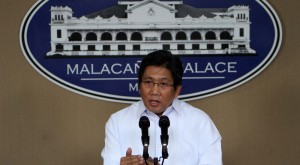Palace admits poor left out of strong economy
MANILA, Philippines—Malacañang acknowledged on Tuesday that the benefits of a strong economy had not trickled down to the poor, but it vowed to focus on job generation amid a recent survey that found a significant decrease in the quality of life of Filipinos.
“We view this as a realistic assessment of the challenges that abound as the national government pursues determined efforts to achieve inclusive and sustained economic growth,” said Communications Secretary Herminio Coloma.
The secretary noted that the “quality of life” survey, conducted by Pulse Asia last December, reported that “fewer Filipinos think that the state of the national economy is better.”
Calamities
Article continues after this advertisement
Pulse Asia also found a significant increase from 29 percent to 50 percent in the number of those who perceived a deterioration within the second semester of the past year.
Article continues after this advertisementBut Coloma cited the calamities that struck the country in 2013 as a cogent reason for the worsening conditions across geographic areas.
“Given the series of calamities that beset the nation in the last quarter of 2013, it is understandable that ratings on personal and national quality of life would deteriorate, as expressed in an increase in the number of those who feel they themselves or the country is ‘worse off’ compared to the same period in 2012,” he said.
Coloma said the largest increase in the number of those who felt that they were personally worse off was registered in the Visayas, where the Bohol earthquake and Supertyphoon “Yolanda” inflicted severe destruction in the latter part of 2013.
He also noted that this was the same survey period that recorded the performance approval and trust ratings of 73 percent and 74 percent, respectively, for President Aquino.
“The President and the Cabinet remain focused on vigorously implementing the priority programs of the Philippine Development Plan that seek to reduce poverty, increase social protection and enable the most needy Filipinos to join the mainstream of social and economic opportunity,” he said.
‘Structural adjustments’
Asked at a briefing in Malacañang that the robust economy would not be described as success if many people were hungry and unemployment remained at 7 percent annually, Coloma said:
“Definitely, the government places a very high priority on employment creation. This is one of the salient aspects of our economic program that seeks to attain inclusive growth. The Department of Labor [and Employment] has rolled out many programs in order to maximize employment creation, but challenges remain.”
He said there were structural adjustments to be made, such as the need to match available skills in the market with requirements of industry.
“Only last week, we discussed in this (press briefing) the shortage in 15 occupational categories where there are very few or hardly any qualified applicants,” he said.
Coloma said this was one of the challenges the labor department was addressing.
1 million jobs a year
He said the labor department had a comprehensive program on job creation, including creating a million jobs a year.
“I think we are aiming to create at least one million jobs a year, and our target is to be able to offer all new graduates employment opportunities. So that’s what we are working on,” Coloma said.
He said the Aquino administration remained focused on improving the overall quality of life in the country following the release of the Pulse Asia survey.
“The government remains committed on improving the overall quality of life of the Filipino by translating the gains of good governance into direct, immediate, and substantial benefits that will empower the poor and marginalized segments of society,” Coloma said.
The country experienced high economic growth under the Aquino presidency, but most Filipinos considered their quality of life, both at the national and personal levels, to have worsened in the previous 12 months.
Pessimistic
Results of a Pulse Asia survey of 1,200 adults all over the country last Dec. 8 to 15 showed that respondents expected the situation to remain the same for the whole of 2014.
The majority of Filipinos (55 percent) said the national quality of life deteriorated in the past 12 months, while 36 percent said the national situation remained unchanged.
The survey has a margin of error of plus-or-minus 3 percentage points at the 95-percent confidence level.
